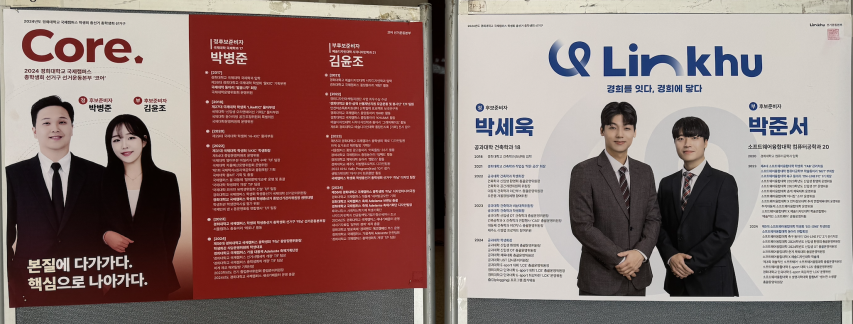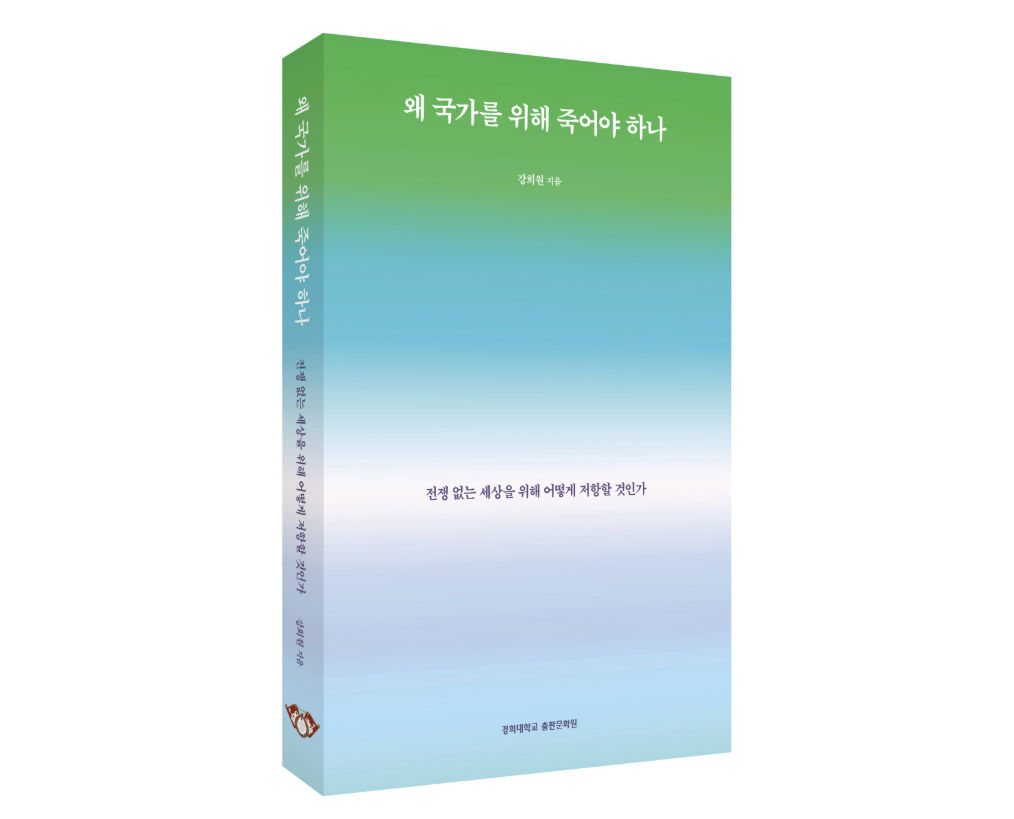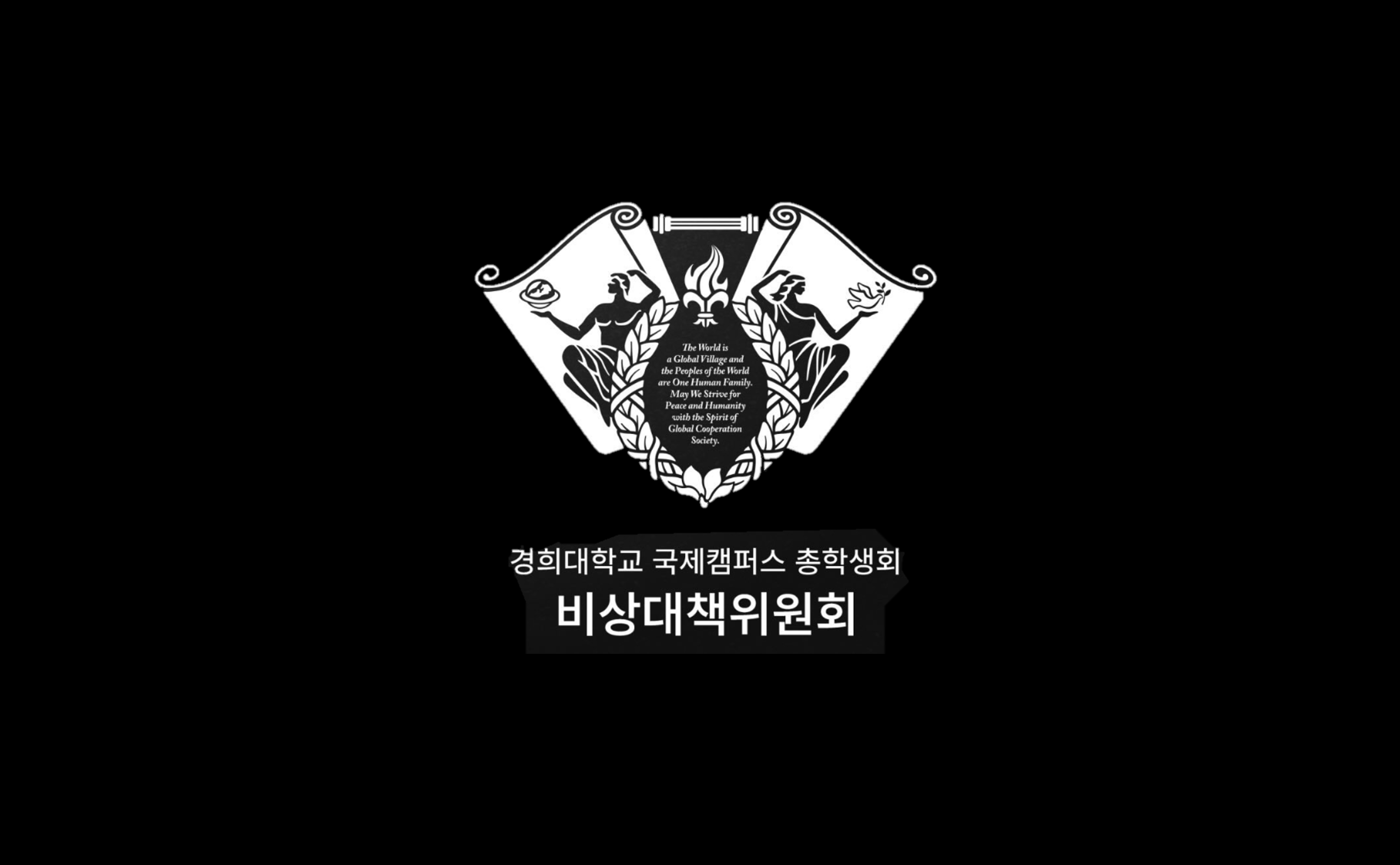[Campus] Deliberation on Election Rule Violations in Global Campus GSA Election
Two Election Campaign Headquarters (ECH), Core and Linkhu, were formed on November 14 for this year's Kyung Hee University (KHU) General Student Association (GSA) election. During the candidate registration period, Core filed an objection against Linkhu, alleging a violation of the KHU Global Campus GSA Election Rules (ER). Following Central Election Committee (CEC) meetings, a penalty was imposed on Linkhu.

The Election Campaign wall post of both ECH, Linkhu and Core
Core’s Stands
In Core’s objection letter submitted on November 12, they accused Linkhu of attempting to extract their information by placing a spy. They claimed that an executive member of Linkhu personally asked a Core member to act as a spy on November 3, although they lacked physical evidence to support this claim. Furthermore, Core argued that the Linkhu member tried to offer rewards to the Core member to facilitate the spying, which led to several Core members leaving the group.
To substantiate their claim, Core presented Kakao Talk chat records as evidence, showing a conversation between the Linkhu ECH executive member and the Core member. According to these records, except for the election promises, the Core ECH member shared various information at the Linkhu member’s request. This included the number of participants in the Core ECH, the group chat list, the chief Core ECH’s name, and the schedule for the Core ECH launching ceremony.
Furthermore, the chat record reflected that the Linkhu member would reward the Core member. The Linkhu member said, “The brothers said they would buy you a drink”—it was unclear who the brothers referred to—adding, “The vice-presidential candidate asked me to tell you that they are sorry and appreciate your efforts.”
Based on this evidence, Core alleged that Linkhu violated parts of ER, including prohibitions against interfering in the election campaign, engaging in slanderous behavior, offering money or entertainment to non-ECH members, and undertaking any actions that compromise the fairness and transparency of the election. With this reasoning, Core submitted an objection letter to the CEC on November 12.
Linkhu’s Explanation
Before the CEC reviewed the case, Linkhu submitted an explanation letter presenting three arguments. First, they asserted that they did not place a spy to obtain information, emphasizing that Core had spread false information to the public.
Moreover, by referring to the Kakao Talk chat record, Linkhu explained that the Core member was actively engaging in the conversation. The Core member told the Linkhu member, “I would be interested in participating in the launching ceremony,” and “Then what should I do next?” indicating that the Core member was not acting under coercion.
Lastly, Linkhu pointed out that the Core member had also requested information from the Linkhu member through the chat, such as ECH’s name and the number of its members. During the conversation, the ECH’s name, Linkhu, was shared with the Core member, suggesting that Linkhu was not the only one who was attempting to extract the information.
To conclude the document, Linkhu highlighted that Core had disclosed unrelated information, which negatively affected its reputation. Core criticized the Linkhu executive member in a wall post, mentioning, “It is regrettable that the member not only failed to take responsibility for its role as the president of the Dept. of Visual Design by resignation but also engaged in dishonest activities.” This is because the KHU Global Campus ER already specified that it is not permitted to hold a position in student government while simultaneously serving as an ECH member.
Result of CEC Deliberation
The CEC concluded its initial deliberation on November 13. They recognized certain evidence as fact, including that the Core ECH list was shared by a Core member, and that the presidential and vice-presidential candidates were presumed likely to reward this Core member. Additionally, they found that a Linkhu member called the Core member to spy and used the obtained information to draw a few Core ECH members.
Based on this reasoning, the CEC issued a warning to Linkhu, mandating that they publish an apology letter within 12 hours following the meeting, which must remain public for two days.
Linkhu's Reconsideration Request
After the initial meeting, Linkhu requested a reconsideration, presenting six reasons. They did not provide additional evidence and instead relied solely on the chat record to support their arguments. Firstly, only chat room members were shared, not the full list, making it difficult to accurately identify the members.
They also stated that it was unclear who would reward the behavior, adding that they could not accept the presumption that the presidential and vice presidential candidates were willing to engage in such actions.
Moreover, they suggested that the Core member was engaging in double-spying. They stated that the Core member tried to extract information about Linkhu by asking several questions, as mentioned in the explanation letter. Furthermore, it was the Core member who shared the chat record with Core, which raised suspicions of double-spying.
Based on these reasons, they argued that the issued warning was unreliable due to a lack of a detailed explanation. They further suggested that the CEC should provide clearer reasoning in their decision.
Lastly, they stated that they could not accept the decision, as it was based on text messages, circumstantial evidence, and an incident that occurred outside of the campaign period.
Reconsideration Results
After the reconsideration meeting, CEC upheld its original decision due to an insufficient basis for the change. The CEC also dismissed the claim of double-spying, stating that the Core member could not have easily obtained information about Linkhu in the same way the Linkhu member had. Moreover, the CEC explained that its decision was based on verifiable facts drawn from the presented evidence and further clarified that election campaigns are not limited to the official campaign period.
Thus, while they acknowledged parts of the arguments—such as the insufficiency of information on the shared list, the vagueness in determining who would reward the member, and the unclear reasoning behind the warning—they concluded that these points were insufficient to alter the decision.
According to the National Election Commission of the Republic of Korea, elections are an essential institution for upholding national sovereignty, allowing citizens to exercise their right to make their own decisions. Within this framework, fair elections are crucial for fostering an inclusive KHU community as well. To achieve this objective, sustained attention must be directed toward the KHU GSA election.
SMPXrrah님의 댓글
Плодотворное раскрутка веб-портала за счет материалов<br><br><p>В актуальном электронном универсуме продвижение интернет-площадки выступает основным компонентом успеха какого-либо цифрового предприятия [url=https://cryptoomsk.ru/]поисковое продвижение сайтов статьи[/url]. Единственным из особенно продуктивных способов продвижения представляется внедрение превосходных публикаций.</p><br><br>[br]Почему следует выбрать популяризацию сайта текстами?[br]<br><br><ul><br><li>Улучшение различимости в поисковиках</li><br><li>Вовлечение определенной массы читателей</li><br><li>Усиление надежности читателей</li><br><li>Создание профессионального реноме</li><br><li>Продолжительный исход от популяризации</li><br></ul><br><br><p>Для того чтобы заказать работу "продвижение сайта материалами", переговорите к специалистам в нише SEO. Знатоки посодействуют подготовить продуктивную тактику популяризации и написать отличные тексты.</p><br><br><p>Стоимостное выражение поддержки "популяризация веб-ресурса публикациями" обуславливается от многих моментов, таких как число желаемых контента, сложность вопроса и соревновательность сферы.</p><br><br><p>Учитывайте, что развитие сайта текстами - это многолетняя вклад в триумф индивидуального интернет-предприятия. Превосходные публикации не только окажут поддержку повысить рейтинги в системах поиска, но и завлекут предполагаемых потребителей, укрепят личный вес в области.</p><br><br>[br]Главные нюансы эффективного раскрутки интернет-площадки текстами[br]<br><br><p>1. Степень содержания: Заметки обязаны быть своеобразными, ценными и уместными для определенной части потребителей.</p><br><br><p>2. Улучшение под ключевики: Умелое применение целевых слов в названиях и изложении заметок окажет поддержку улучшить узнаваемость в поисковых сервисах.</p><br><br><p>3. Периодичность публикаций: Периодическое пополнение содержания свидетельствует системам поиска, что личный веб-ресурс функционирует и своевременен.</p><br><br><p>4. Спектр платформ для представления: Разброс публикаций на различных отраслевых сайтах содействует сформировать большую конструкцию линков.</p><br><br>[br]Выгоды развития сайта заметками[br]<br><br><ul><br><li>Многолетний плод: Отличные контенты держатся злободневными и нужными в продолжение многолетнего отрезка.</li><br><br><li>Рост надежности пользователей: Насыщенные контенты свидетельствуют личную осведомленность в секторе.</li><br><br><li>Завлечение определенной аудитории: Заметки помогают привлечь непосредственно тех гостей, которые любопытствуют в своем предложении или поддержке.</li><br></ul><br><br><p>Получить обслуживание по развитию онлайн-проекта текстами выполнимо у квалифицированных SEO-специалистов. Специалисты посодействуют разработать особую стратегию популяризации, принимающую во внимание свойства вашего бизнес-проекта и специализированной массы читателей.</p><br><br><br>[br]Последовательность раскрутки онлайн-проекта статьями[br]<br><br><p>1. Исследование сферы и конкурирующих: Эксперты проводят тщательный обследование вашей сферы и конкурирующих.</p><br><br><p>2. Составление схемы: На фундаменте добытых результатов создается специальная стратегия популяризации.</p><br><br><p>3. Фильтрация семантического ядра: Устанавливаются чрезвычайно применимые поисковые фразы для индивидуального бизнес-проекта.</p><br><br><p>4. Создание информации: Профессиональные контент-мейкеры формируют своеобразные и содержательные статьи, улучшенные под подобранные ключевики.</p><br><br><p>5. Выставление заметок: Контент располагается на многочисленных специализированных порталах и журналах.</p><br><br><p>6. Контроль и обследование исходов: Стабильно делается исследование плодотворности кампании и делаются существенные поправки.</p><br><br>[br]Что входит в поддержку по пиару веб-портала публикациями?[br]<br><br><ul><br><li>Исследование соревнующихся и сферы</li><br><li>Планирование схемы работы с контентом</li><br><li>Фильтрация уместных ключевых слов</li><br><li>Разработка эксклюзивного и оптимизированного контента</li><br><li>Расположение заметок на влиятельных сайтах</li><br><li>Слежение и исследование эффективности</li><br><li>Стабильные информации о результатах продвижения</li><br></ul><br><br><p>Принимайте во внимание, что стоимостное выражение поддержки по популяризации веб-портала текстами может изменяться в подчинении от совокупности операций и затруднительности собственной отрасли. Тем не менее вкладывания в качественное популяризацию контентом в большинстве случаев оправдываются за благодаря умножения посещаемости и преобразований.</p><br><br>
- 1
- 2
I agree to the collection of personal information. [view]



